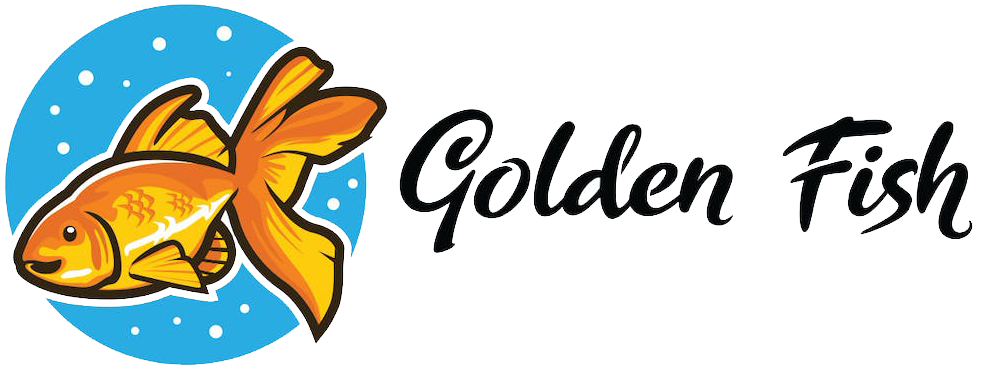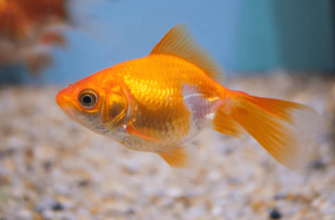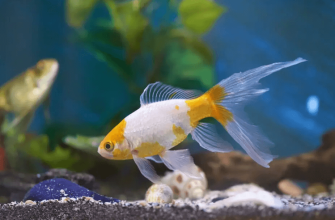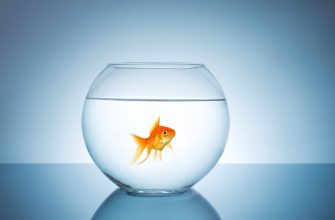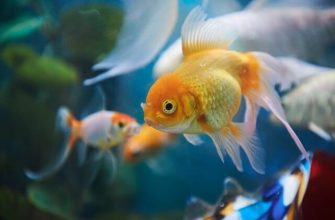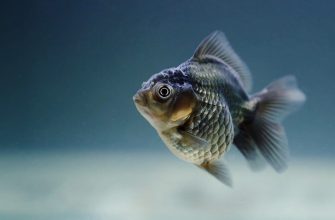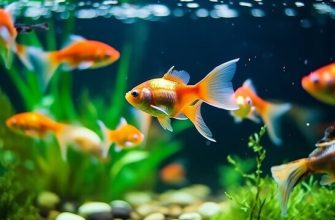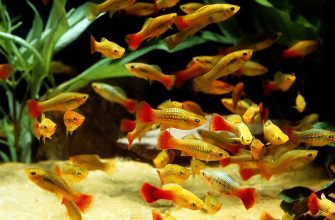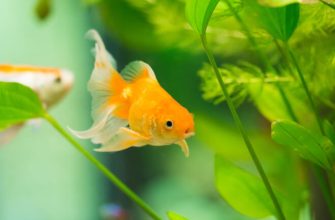Bearded dragons are intriguing reptiles that have gained popularity as pets in recent years. Many owners adore their peculiar behavior and taking care of their distinct needs. An inquiry that often comes up is: can bearded dragons eat goldfish? Let’s delve into this captivating topic and investigate the possibilities.
When it comes to their dietary requirements, it’s essential to offer bearded dragons a balanced and healthy diet. These omnivorous creatures usually consume various insects, fruits, vegetables, and even some vertebrates. Nevertheless, goldfish may not be the ideal meal for them.
Goldfish are known for having high fat content and low nutritional value. Even though they may seem like a yummy snack, feeding them frequently to your bearded dragon can cause health issues in the long run. The high fat intake from goldfish can result in obesity and potentially lead to fatty liver disease, which can affect your dragon’s general well-being.
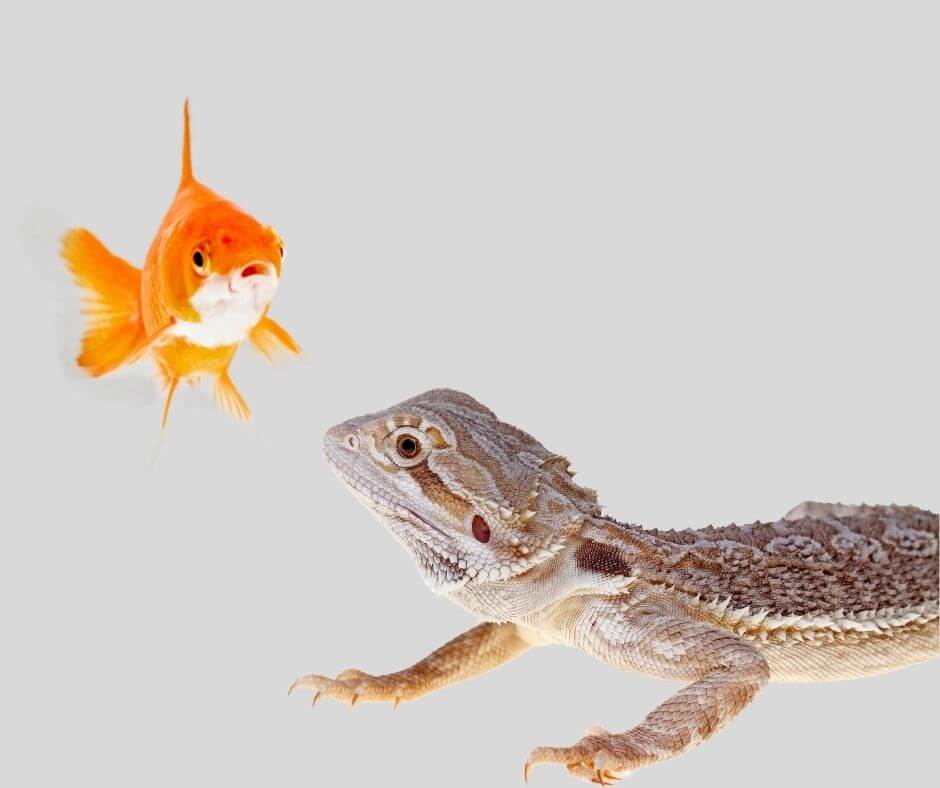
Rather than counting on goldfish, it’s wise to include a variety of protein-rich insects such as crickets or mealworms in your bearded dragon’s diet. These options provide essential nutrients like calcium and protein without the adverse effects associated with goldfish consumption.
Can Bearded Dragons Eat Goldfish?
Bearded dragons can eat goldfish as part of their diet. However, it is important to note that goldfish should not be the primary food source for bearded dragons. They should be fed a varied diet consisting of insects, vegetables, and occasionally fruits. Goldfish can be given as an occasional treat, but should not be the main source of nutrition for bearded dragons.
It is worth mentioning that goldfish should be fed to bearded dragons in moderation due to their high fat content. Feeding them too many goldfish can lead to obesity and other health issues. Therefore, it is important to provide a balanced diet for bearded dragons to ensure their overall health and well-being.
As a cautionary tale, a reptile enthusiast once fed their bearded dragon a diet consisting mostly of goldfish. Over time, the bearded dragon developed obesity and experienced health problems. This story serves as a reminder of the importance of providing a varied and balanced diet for these reptiles.
Bearded dragons may have a rough exterior, but their taste in food is anything but fishy.
| Food | Can Eat |
|---|---|
| Goldfish | Yes |
| Insects | Yes |
| Vegetables | Yes |
| Fruits | Occasionally |
Background information on bearded dragons and their diet
Bearded dragons, a popular reptile pet known for their spiky beards, have specific dietary needs. Crickets and mealworms, along with leafy greens and vegetables, make up their primary diet. Providing a balanced diet is key to their overall health.
These reptiles are omnivores, so give them different food options to meet their nutritional needs. Fruits can be offered in moderation. But, some foods should be avoided due to potential health risks.
Goldfish, kept as aquarium pets, may seem like a tasty treat for bearded dragons. Yet, it is not recommended. Goldfish are high in fat and lack essential nutrients these reptiles need. What’s more, goldfish contain thiaminase, which can interfere with vitamin B1 absorption.
Feeding goldfish to bearded dragons can lead to health issues. It’s better to offer varied options that fulfill their dietary needs.
Explanation of the nutritional needs of bearded dragons
Bearded dragons must be fed properly to stay healthy. Protein sources include crickets, mealworms, silkworms, and phoenix worms. The majority of their diet should be veggies like collard greens, kale, and butternut squash. Avoid feeding them too much fruit as this can be high in sugar. Calcium supplements are necessary to keep them safe from metabolic bone disease.
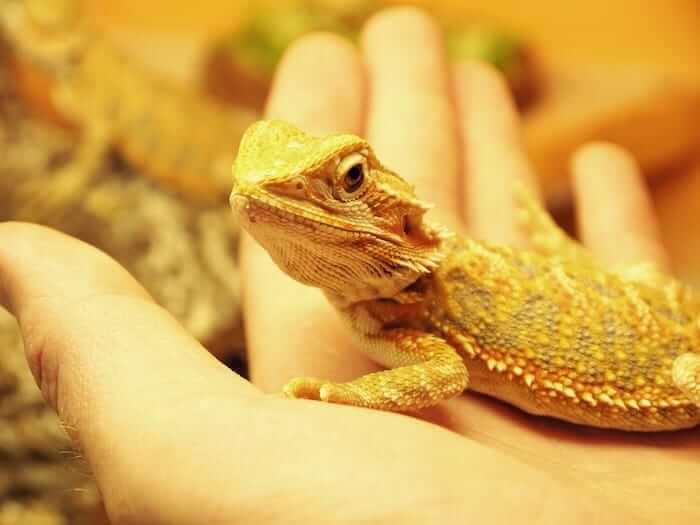
To meet their needs, provide a range of insects for protein and enrichment. Mustard greens and dandelion greens offer vitamins A and K, while bell peppers provide vitamin C. Make sure to feed them veggies of many colors.
UVB light is also important for calcium absorption. Young dragons need to eat more often than adults because they grow faster. The University of California Davis Veterinary Medicine found that leafy greens aid digestion in bearded dragons, so make sure to include enough veggies.
Potential Dangers of Feeding Goldfish to Bearded Dragons
Potential Hazards of Feeding Goldfish to Bearded Dragons
Feeding goldfish to bearded dragons poses several dangers. These are as follows:
- Malnutrition: Goldfish lack the appropriate nutritional content required for the optimal health of bearded dragons. They are deficient in essential vitamins and minerals that dragons need to thrive.
- Digestive Issues: Goldfish have a higher fat content, which can lead to digestive problems in bearded dragons. This can result in diarrhea and other gastrointestinal disturbances.
- High Phosphorus Levels: Goldfish have elevated levels of phosphorus, which can disrupt the calcium-to-phosphorus ratio in bearded dragons. This can lead to metabolic bone disease, causing weakened bones and fractures.
- Parasite Transmission: Goldfish may carry parasites such as flukes and nematodes, which can be transmitted to bearded dragons. These parasites can cause health issues and affect the overall well-being of the dragons.
- Choking Hazard: The size of goldfish can pose a choking hazard for bearded dragons, especially if they are too large to be swallowed whole. This can result in blockages in the digestive system and potentially lead to life-threatening complications.
It is important to note that feeding goldfish to bearded dragons can have detrimental effects on their health. Thus, it is recommended to provide a well-balanced diet consisting of appropriate feeder insects, dark leafy greens, and other vegetables to ensure their nutritional needs are met.
Bearded dragons have evolved to thrive on a diverse diet in the wild, which does not typically include goldfish. Therefore, it is crucial to prioritize their well-being and avoid the potential hazards associated with feeding them these types of fish.
As responsible pet owners, it is crucial to research and provide the best diet for our bearded dragons to promote their overall health and longevity. Feeding them a variety of nutrient-rich foods in appropriate portions is essential for their well-being. Remember, the nutritional needs of bearded dragons differ from those of goldfish, so it is best to consult with a veterinarian or reptile nutrition specialist for personalized dietary recommendations.
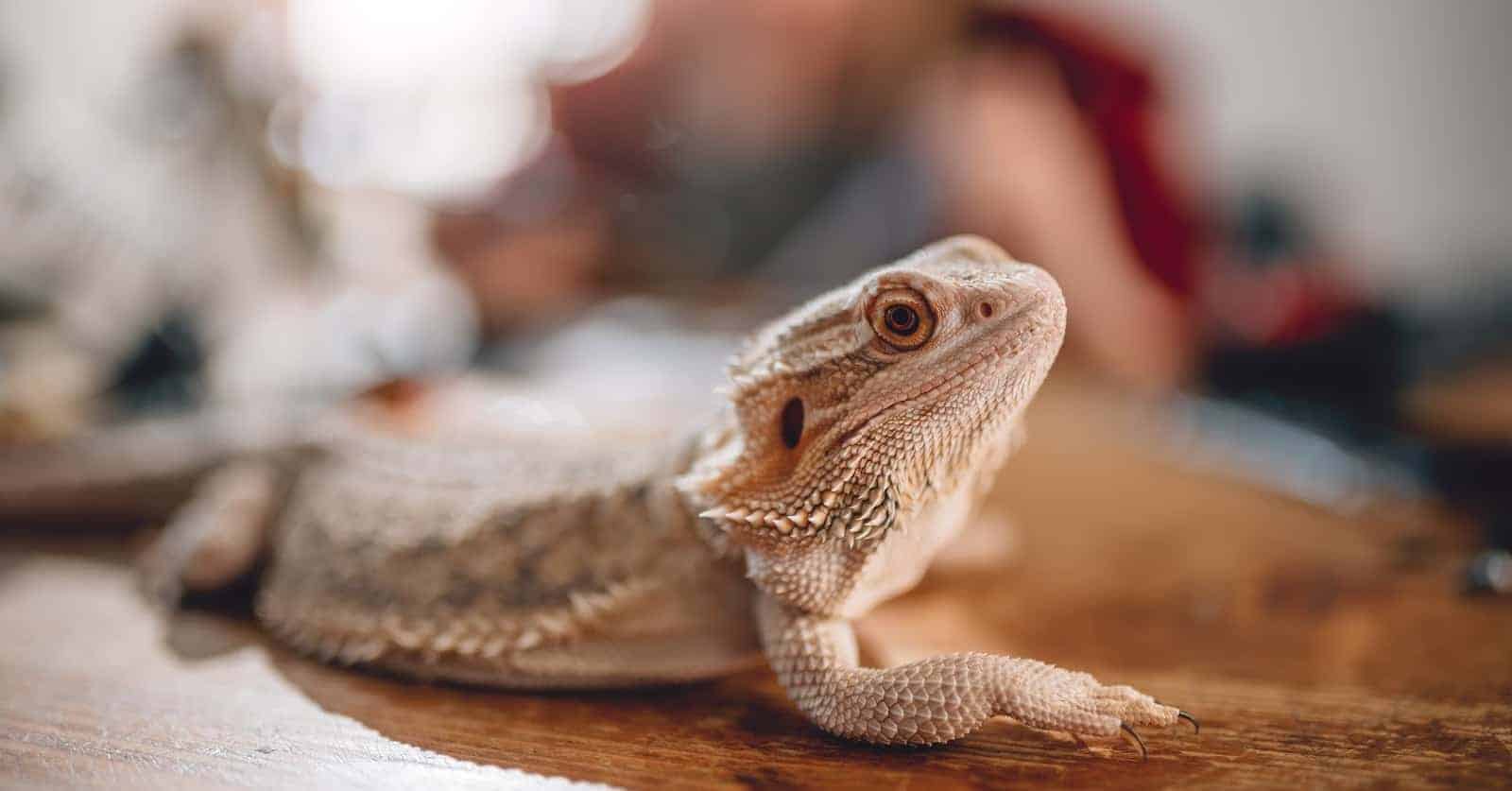
Historically, there have been instances where well-meaning owners fed goldfish to their bearded dragons, unaware of the potential risks. Unfortunately, these dragons experienced health problems, emphasizing the importance of understanding the proper diet for these reptiles. By learning from past mistakes, we can prioritize the health and well-being of our scaly companions.
Feeding goldfish to bearded dragons may not be the smartest move, unless you’re trying to introduce your pet to the concept of revenge from beyond the grave.
Discussion of the risks associated with feeding goldfish
Goldfish may bring risks if fed to bearded dragons. It’s worth discussing these, as they can affect the reptiles’ health. Here are some of the risks:
- Bones can cause internal injuries if swallowed whole.
- High fat content may lead to digestive issues like diarrhoea or constipation.
- Goldfish lack the nutrients needed for dragons. Eating them exclusively could cause malnutrition.
- Goldfish may carry parasites or bacteria that could infect dragons.
- High-fat goldfish can cause obesity, bad for their health and lifespan.
- Spines on fins can injure the mouth and throat while trying to eat them.
It’s possible to feed small amounts of prepared goldfish occasionally. But experts still advise against relying only on goldfish for a bearded dragon’s food.
In the past, inexperienced owners would feed only goldfish. This caused health issues such as organ failure and deficiencies. Now it’s recommended to give a varied diet with suitable insects and veg, plus occasional treats.
Explanation of the specific nutrients that goldfish lack
Goldfish, often fed to bearded dragons, lack essential nutrients needed for their health. These include vitamin C – aiding immune function and tissue repair – and vitamin D3, important for calcium absorption. Plus, their omega-3 to omega-6 ratio is imbalanced, raising the risk of cardiovascular issues for the dragons.
Goldfish may seem like an easy choice, but they don’t provide all the nutrients needed. Vitamin deficiencies can weaken immune systems and stop growth in dragons. Unbalanced fatty acids can increase the risk of heart diseases, like inflammation and plaque buildup.
To keep your bearded dragon healthy, research and choose a balanced diet with proper feeder insects. Options like crickets, mealworms, and dubia roaches are vitamin- and mineral-rich.
Prioritize nutrition for your dragon over convenience. Don’t let them miss out on vital nutrients – choose their diet wisely!
Alternatives to Feeding Goldfish to Bearded Dragons
Feeding goldfish to bearded dragons may not be the most ideal option for their diet due to the potential risks associated with it. However, there are several alternatives that can provide a balanced and nutritious meal for these reptiles.
To provide a variety of options for bearded dragons, here are some alternatives to feeding goldfish:
| 1. Insects | – Crickets | – Mealworms |
| 2. Vegetables | – Collard greens | – Bell peppers |
| 3. Fruits | – Blueberries | – Papaya |
Insects such as crickets and mealworms are a staple food for bearded dragons, providing necessary protein and nutrients. Vegetables like collard greens and bell peppers offer valuable vitamins and fiber. Fruits such as blueberries and papaya can be included as occasional treats.
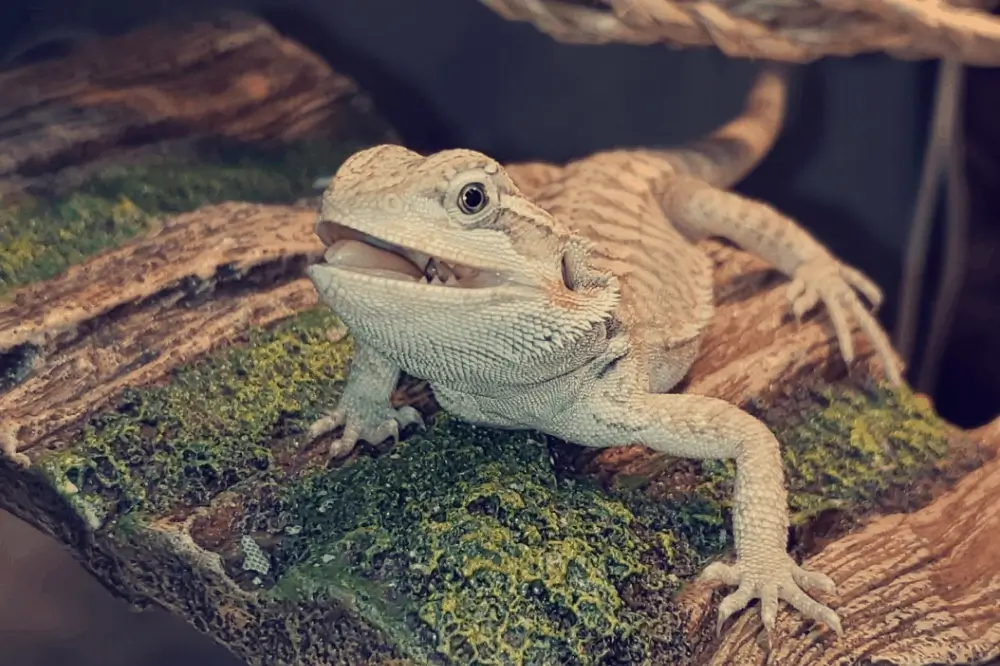
It’s important to note that bearded dragons have specific dietary requirements, so it is essential to research and consult with a reptile veterinarian to ensure a proper balance of nutrients.
Pro Tip: Remember to dust insects and vegetables with calcium and vitamin supplements to enhance their nutritional value for your bearded dragon.
From insects to veggies, these dragons have more dietary options than your picky significant other.
List of suitable food options for bearded dragons
Bearded dragons need a wide variety of food to thrive. Here are some good options:
- Fresh veggies like collard greens, kale, and carrots for vitamins and nutrients.
- Crickets, mealworms, and dubia roaches for protein and variation.
- Occasional treats such as apples, strawberries, and bananas.
- Calcium supplements for healthy bone development.
- Commercially-prepared pellets to supplement, but not be the only source of nutrition.
- Water, either by misting or in a shallow dish.
Plus, goldfish should not be fed to bearded dragons. Though they’re easily found in pet stores, they don’t provide the necessary nutrition for these reptiles. So, provide a balanced diet with the above food items.
I know someone who didn’t do the proper research when it came to the diet of his bearded dragon. He was feeding him goldfish, not realizing the lack of nutrition. His pet had health issues as a result. This is a reminder that research and knowledge are key when it comes to caring for our scaly friends.
Explanation of the nutritional benefits of these alternative options
Goldfish may be a popular food for bearded dragons, but there are other options with different nutrients. These can provide a balanced diet to keep your dragon healthy.
- Insects: Crickets, mealworms, and waxworms are good sources of protein and essential nutrients. They also have calcium for bones.
- Leafy Greens: Kale, collard greens, and dandelion greens have vitamins and minerals. Plus, they are low in oxalates which stops kidney stones.
- Fruits: Strawberries, blueberries, and mangoes are full of vitamins. But, they should only be given in small amounts due to the sugar.
- Vegetables: Carrots, bell peppers, and squash provide fiber for digestion. They also have antioxidants for health.
- Commercial Diets: Quality diets for bearded dragons include proteins, vitamins, minerals, and other nutrients.
No one option is enough for a dragon’s nutrition. Combining the options with the right amounts will give them a good diet. Enhance their wellbeing by trying these options today!
Proper Feeding Techniques for Bearded Dragons
Properly Nourishing Approaches for Bearded Dragons:
Bearded dragons require specific feeding techniques to ensure their optimal health and well-being. Here are six key points to consider when feeding these reptiles:
- Diet Composition: Bearded dragons thrive on a varied diet consisting primarily of leafy greens, vegetables, and insects. Providing a balanced mix of fresh fruits and veggies is crucial for meeting their nutritional needs.
- Insect Selection: When offering insects as part of their diet, choose appropriate options such as crickets, mealworms, and roaches. Avoid feeding them insects that are too large, as this can lead to digestion issues.
- Calcium and Vitamin Supplementation: Bearded dragons need calcium and vitamin D3 to support proper bone growth and metabolism. Dust their food with a reptile-specific calcium supplement to ensure they receive these essential nutrients.
- Feeding Frequency: Young bearded dragons require more frequent feedings, typically twice a day. As they mature, reducing the frequency to once a day or every other day is appropriate. Adjust the feeding schedule based on their age and individual needs.
- Temperature and Lighting: Ensure that your bearded dragon’s enclosure provides the appropriate temperature gradient, with a basking spot reaching around 95-100°F (35-38°C). Adequate UVB lighting is also essential for their calcium metabolism and overall health.
- Water and Hydration: While bearded dragons primarily obtain their hydration from the food they eat, it’s important to provide them with a shallow dish of clean, fresh water. Regularly monitor and refill the water to ensure they stay hydrated.
It’s worth noting that each bearded dragon is unique, so it’s essential to tailor their diet and feeding routine based on their individual needs and preferences.
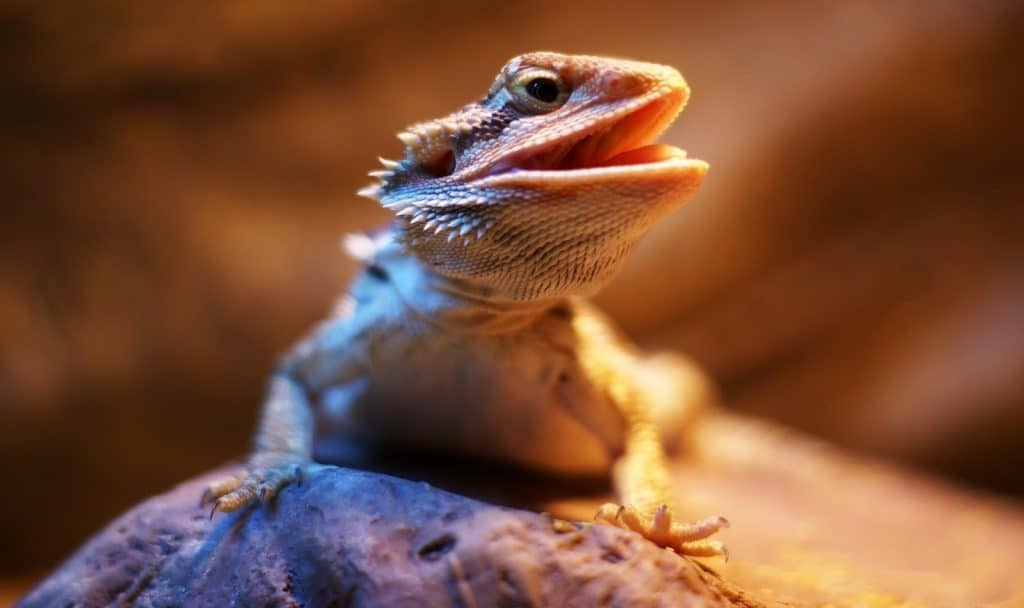
Furthermore, be aware that offering goldfish as a food source for bearded dragons is not recommended. Goldfish are high in fat and can potentially contain parasites or harmful bacteria. Opt for safer and more suitable prey options, as mentioned earlier.
On another note, research conducted by the Journal of Herpetology confirms that providing proper nutrition to bearded dragons helps maintain their overall health and longevity.
How to prepare food for bearded dragons:
- Step 1- open the fridge,
- Step 2- close the fridge,
- Step 3- go to the pet store,
- Step 4- buy some crickets,
- Step 5- wonder why you bothered opening the fridge in the first place.
Step-by-step instructions on how to prepare food for bearded dragons
Having a healthy, happy bearded dragon requires special steps for preparing food. Here’s a guide to feed your scaly pal.
- Obtain the ingredients:
- Vegetables: Collard greens, kale, and dandelion greens are good choices.
- Fruits: Berries or melon as treats occasionally.
- Protein: Crickets, mealworms, and dubia roaches.
- Supplements: Calcium and vitamins for their health.
- Rinse veggies to remove dirt and pesticides. Cut them into small pieces.
- Form a balanced mix of vegetables and protein sources. Vary the ratios based on your dragon’s age and diet.
Be aware that too much fruit can lead to issues like diarrhea or obesity. Make sure to provide a variety of fresh veggies as the main part of their diet.
Plus, remember to sprinkle calcium and vitamin supplements on the insects before you give them to your dragon. This prevents nutrient deficiencies and encourages proper growth.
Experts from the National Reptile Zoo underline the importance of offering a varied diet to guarantee bearded dragons get all the nutrients they need in captivity.
Tips for feeding and monitoring the diet of bearded dragons
Looking after a bearded dragon’s diet is extremely important for their health. Here are some tips to help:
- Offer a mix of insects like crickets, mealworms, and roaches, plus fruits and leafy greens.
- Dust the insects with calcium powder to avoid calcium deficiency.
- Keep an eye on their appetite and adjust portion sizes.
- Provide fresh water in a shallow dish or by misting the enclosure.
Bearded dragons need a specific temperature and lighting to aid digestion and metabolism. The basking spot should be 95-105°F, while the cooler side should be 80°F. Use UVB lighting to give them ultraviolet rays for vitamin D.
I remember when I first met Spike, a bearded dragon, who wouldn’t eat his vegetables. His owner tried everything, even chopping them up and mixing them with his favorite insects! In the end, it was Spike’s curiosity that worked – he became captivated by the moving worms in a salad spinner! This made mealtime enjoyable for both Spike and his owner.
Above all, make sure your dragon is healthy and content by giving them a balanced diet and excellent care.
Conclusion
Bearded dragons can eat goldfish, but it’s not the best idea. Goldfish don’t have the right nutrients and have too much phosphorus – this can cause health problems. To give them the nutrients they need, feed them different food like insects and leafy greens. Pro Tip: Talk to a vet who knows about reptiles for help with giving your bearded dragon a balanced and healthy diet.
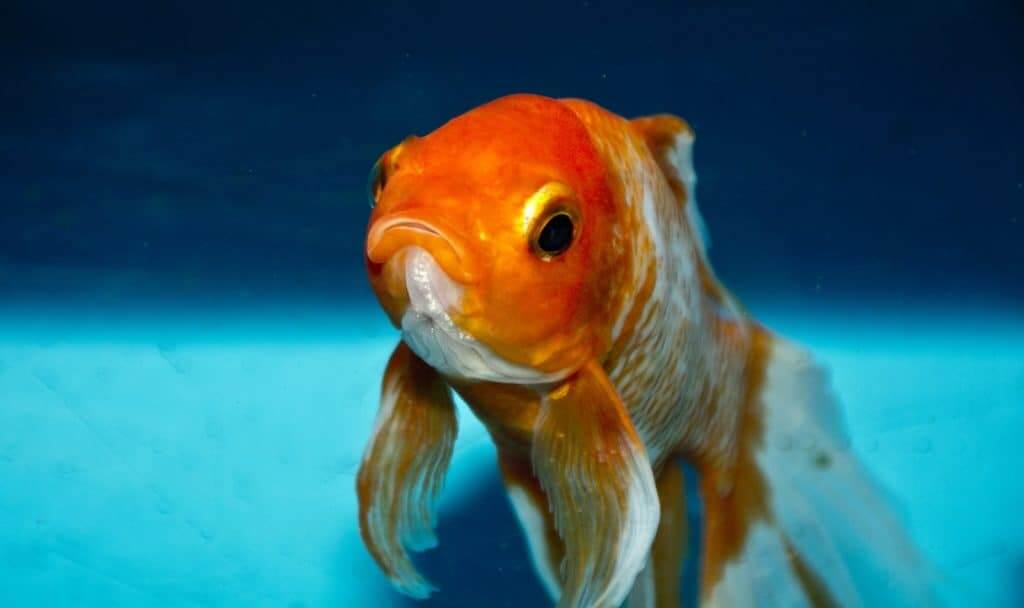
Additional Resources and References
Explore more info on caring for bearded dragons! Get useful insights, tips and guidance from these sources:
- Online forums – connect with experienced owners and enthusiasts.
- Reptile books – get comprehensive info on habitat setup, feeding, health issues and behavior.
- Reptile veterinarians – for accurate health assessments and medical advice.
- Herpetological societies – network with other reptile enthusiasts and attend educational events.
Plus, check out online video tutorials that show hands-on techniques like trimming nails and introducing new food. Get practical insights into effective caregiving practices!
For making the most of these resources, here are some tips:
- Participate actively in online forums and share your experiences.
- Look for recent books written by reputable authors/vets.
- Establish a relationship with a reptile vet with experience in bearded dragons.
- Attend local herpetological society meetings and workshops.
Network and access specialized knowledge to better understand caring for bearded dragons. The combination of reliable sources and expert advice will help keep your scaly friend healthy and happy!
Frequently Asked Questions
Can bearded dragons eat goldfish?
Yes, bearded dragons can eat goldfish as an occasional treat. However, goldfish should not be a staple part of their diet as they are high in fat and lack essential nutrients.
What are the risks of feeding goldfish to bearded dragons?
Feeding goldfish to bearded dragons regularly can lead to obesity and other health issues due to their high fat content. It can also cause vitamin deficiencies as goldfish lack certain essential nutrients required by bearded dragons.
How often can bearded dragons eat goldfish?
It is recommended to feed goldfish to bearded dragons only as an occasional treat, no more than once a month. Their diet should primarily consist of insects, vegetables, and fruits that provide a more balanced nutrition.
What size of goldfish is suitable for bearded dragons?
If feeding goldfish to your bearded dragon, it is important to choose an appropriate size based on the dragon’s age and size. Generally, young bearded dragons can handle small goldfish, while larger adults can eat bigger ones. Ensure the goldfish offered are smaller than the dragon’s head.
Should goldfish be fed live or frozen?
Bearded dragons can be fed live or frozen goldfish. However, if choosing to feed live goldfish, make sure they are from a trusted source to avoid any potential health risks or parasites. Frozen goldfish should be thawed before offering them to your bearded dragon.
Are there any alternatives to goldfish for bearded dragons?
Yes, there are several alternative food options for bearded dragons that provide better nutrition than goldfish. Some suitable alternatives include crickets, mealworms, dubia roaches, leafy greens, fruits, and vegetables. It is essential to maintain a varied and balanced diet for the optimal health of your bearded dragon.
